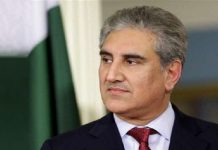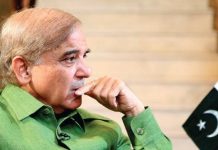مضمون کا ماخذ : گنہر نا لوٹیریا
Noreen blames social media for her radicalisation
The interview of 19-year-old Noreen Leghari by 92 News, who was arrested in Lahore before the planned Easter attack, has received a mixed response from the audience, as people hit the social media websites to show their sympathies or criticise the decision of interviewing a radical in the first place. The incident comes approximately a […]
The interview of 19-year-old Noreen Leghari by 92 News, who was arrested in Lahore before the planned Easter attack, has received a mixed response from the audience, as people hit the social media websites to show their sympathies or criticise the decision of interviewing a radical in the first place.
The incident comes approximately a week after the interview of TTP spokesperson Ehsanullah Ehsan was banned from airing by the PEMRA.
But this time around, despite the complaints of civil society activists, the programme was aired and went unchecked by the regulatory body.
Pakistan has seen an increased number of such confessional interviews in recent times. While the people have given a mixed response to these confessional interviews, analysts termed it a dangerous practice – calling that these statements are being using for wooing public sentiment.
Noreen started the interview by blaming the social media for her radicalisation. “I saw some Facebook pages and Instagram posts that preached Khilafat, and from there my mind turned towards it,” explained Noreen. “I knew the concept of Khilafat and was interested in doing hijrat as well. People of some banned organisation approached me and told me to come to Lahore first,” added Noreen. Upon asking why did she believe that the persons she was in contact with were true representatives of Khilafat, Noreen explained that they talked a lot about religion, which convinced her to move to Lahore.
She made it clear that she did not discuss any of these things with her class fellows at the university.
When asked her father Dr Jabbar Leghari, who was also being interviewed, if he had observed any changes in his daughter’s behaviour, his responded by saying that she had never shown any unusual behaviour. “We are a normal family… with no history of having extremist thoughts… our family members never discussed such things.”
He said that after Noreen’s sudden disappearance, the first thought that hit him was “approach the police [and] other law enforcement agencies”. He said that he had made personal requests to high-ups in the law enforcement agencies, to which he received a very positive response, especially from the chief of army staff. “The DG MI (Military Intelligence) did a great job… by recovering my daughter from [the clutches of] those criminals.”
“We can keep checks on the activities of our children until midnight. After that we don’t know what they are doing [on the social media, using their mobile phones and tabs]… my daughter did the same thing… browsing social media pages till late in the night,” he said.
When the anchor asked Noreen if she was that naive to believe everything those criminal elements were telling about Islam, and whether she bothered to check if all that was actually in accordance with Islam, she replied by saying, “Everything they told me to [watch in videos and] learn, most of which was about jihad, were quotations [from religious scriptures]… they said that they were just giving references from the Holy Quran and hadith, which [were actually there]… so I believed.”
She nodded when the interviewer asked whether they used to give a misinterpretation of Quranic verses. “I couldn’t [dare] contradict.”
She said that her prime focus was on hijrat, and at a later stage “I would decide what to do next”. “I just wanted to go there [Lahore], which was the main problem. That was as far as I had thought.”
When asked if she had any regrets, Noreen abruptly said, “Yes, because only I know what I saw there… and what they wanted me to do. It was strange… I left [home] for something else…”
The interview that lasted over half an hour received a mixed response from the social media as people were divided on whether such a person should have been given airtime in the first place.
Journalist Zarar Khuhro showed his disappointment over the interview by tweeting, “‘Noreen Leghari deserves forgiveness because she got caught before committing mass murder’ line is beyond ridiculous.”
Journalists and human rights activists also criticised the interview and the strange trend the state is setting by tweeting, “First Ehsanullah Ehsan and now Noreen Leghari. Both humanised, sanitised. The game is on, and it’s actually pretty dangerous. And ridiculous.”
While another commentator added, “Future historians will look back at incredulity at the decisions to rehabilitate Noreen Leghari and Ehsanullah Ehsan.”












